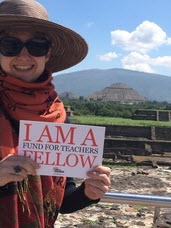Back in the ’80s, when Saturday Night Live was funny, Jon Lovitz did a skit called “Get to Know Me!” espousing how people (i.e. Steve Martin) benefited from knowing him. We believe the same is true of our 2019 Fellows and are, therefore, continuing a blog series throughout the summer to introduce you to many of our grant recipients.
Today, in celebration of Ramadan, we highlight a teacher pursuing learning about the Arabic language and Muslim culture. Karina Escajeda (Cony Middle and High School – Augusta, ME) will complete Arabic language & cultural immersion at The Arabic Language School in Dahab, Egypt, to improve family partnerships and refugee student engagement; create community workshops; and increase student understanding of the value peers emigrating from Iraq and Syria add to the school culture.
[minti_divider style=”3″ icon=”” margin=”20px 0px 20px 0px”]
On Why Karina Designed This Fellowship
Two years ago, in the midst of a national debate regarding refugees, I resigned from my teaching position at a nearby private boarding school in order to take a position in my hometown, at my former high school. I was deeply aware that my English teaching skills and interest in community development were needed here. In the past seven years, Arabic speakers have become our community’s second-largest demographic, numbering over 1000 residents and making up 5% of the population. With this shift, there has been some divisive rhetoric in our community about refugees.
Our students need to develop an understanding of how to best honor differences. It is imperative that we connect with our new residents and educate our long-term residents about Arabic culture and language to grow stronger as a blended community. I am dedicated to showing our students from Iraq and Syria that we in our small town value who they are and where they come from.
On Her Itinerary

St. Catherine’s Monastery on Mt. Sinai
At The Arabic Language School in Dahab, Egypt, I will be placed in a class that is appropriate to my level of Arabic. There are no in-person Arabic classes within 72 miles of my community, so I have begun formal Arabic study online; however, this particular school focuses on one-on-one attention. The include ten hours a week of individualized; one-on-one lessons in the afternoons; and cultural outings in the town so that students are exposed to spoken Arabic. On one weekend, I will go to Mt. Sinai and St. Catherine’s Monastery (included by the Islamic Educational, Scientific, and Cultural Organization in its world heritage and culture list). I’ll also embark on a desert hike and overnight at a Bedouin camp to understand the rural, conservative experience of many of our district’s language learners. When the course ends, I will fly from Sharm to Cairo to join a four-day cultural and historical tour of Cairo, Luxor, and Giza.
On How Her Students and Their Families Feel About Her Fellowship
 My students and their parents are so excited about my immersion experience. They know that I will have a Weebly site for them to follow, and they are excited for my videos, interviews, and pictures that I will post. All of my Arabic-speaking students are from Syria and Iraq. Their spoken Arabic dialects are mutually understandable, but very different from each other. Syrians speak the Shaami dialect and some Iraqis, my students included, speak the Gulf dialect. I will be learning the Egyptian dialect, which they think is wonderfully hilarious. It’s a bit like American, Australian, and British English. They can’t wait until I come back and start talking.
My students and their parents are so excited about my immersion experience. They know that I will have a Weebly site for them to follow, and they are excited for my videos, interviews, and pictures that I will post. All of my Arabic-speaking students are from Syria and Iraq. Their spoken Arabic dialects are mutually understandable, but very different from each other. Syrians speak the Shaami dialect and some Iraqis, my students included, speak the Gulf dialect. I will be learning the Egyptian dialect, which they think is wonderfully hilarious. It’s a bit like American, Australian, and British English. They can’t wait until I come back and start talking.
[minti_divider style=”3″ icon=”” margin=”20px 0px 20px 0px”]
 Karina is a K-12 English Language Learner Specialist and the only teacher in the district who has begun to dedicate time to the study of Arabic language and culture. For more than 20 years, she has lived, taught, and administrated programs at public and private schools in California, Maine, Honduras, Mexico, and Japan. She believes in collaboration, authentic tasks, and honoring the achievements of each individual language learner. She has been awarded a 2020 Fulbright DA Teacher Fellowship in Greece, studying refugee integration and teacher training.
Karina is a K-12 English Language Learner Specialist and the only teacher in the district who has begun to dedicate time to the study of Arabic language and culture. For more than 20 years, she has lived, taught, and administrated programs at public and private schools in California, Maine, Honduras, Mexico, and Japan. She believes in collaboration, authentic tasks, and honoring the achievements of each individual language learner. She has been awarded a 2020 Fulbright DA Teacher Fellowship in Greece, studying refugee integration and teacher training.



 classes 30 hours per week, toured local schools and important cultural sites, met local teachers and constantly interacted with people in Spanish.
classes 30 hours per week, toured local schools and important cultural sites, met local teachers and constantly interacted with people in Spanish. Lana is a speech-language pathologist for the
Lana is a speech-language pathologist for the 
 This fall, Sonja and Miriam (both members of Chase Elementary’s Mutlicultural Committee) hosted the school’s first Albanian Heritage Celebration. Each grade completed related projects in preparation for the community-wide event:
This fall, Sonja and Miriam (both members of Chase Elementary’s Mutlicultural Committee) hosted the school’s first Albanian Heritage Celebration. Each grade completed related projects in preparation for the community-wide event: